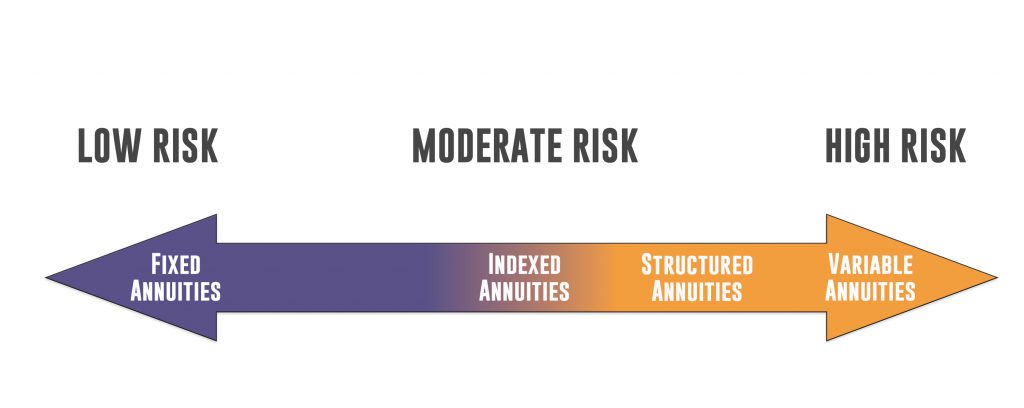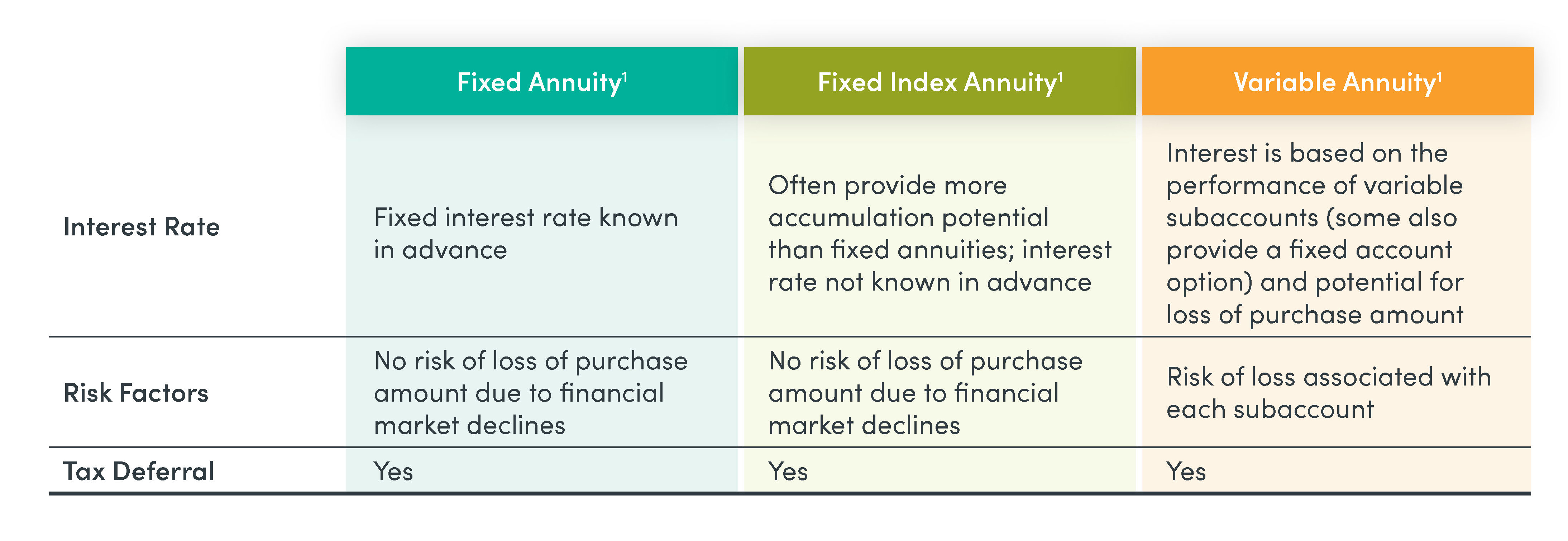All Categories
Featured
Table of Contents
There are 3 kinds of annuities: dealt with, variable and indexed. With a taken care of annuity, the insurer assures both the rate of return (the passion rate) and the payment to the financier. The interest price on a repaired annuity can change gradually. Commonly the rate of interest is fixed for a variety of years and after that modifications occasionally based on present rates.
With a deferred set annuity, the insurer agrees to pay you no much less than a defined rate of rate of interest during the time that your account is expanding. With a prompt set annuityor when you "annuitize" your deferred annuityyou get a predetermined set amount of money, usually on a month-to-month basis (comparable to a pension plan).
While a variable annuity has the advantage of tax-deferred growth, its annual costs are likely to be a lot greater than the expenses of a typical common fund. And, unlike a taken care of annuity, variable annuities don't give any kind of assurance that you'll make a return on your investment. Instead, there's a danger that you might actually lose money.
Exploring Immediate Fixed Annuity Vs Variable Annuity Key Insights on Fixed Vs Variable Annuities What Is the Best Retirement Option? Features of Smart Investment Choices Why Choosing the Right Financial Strategy Matters for Retirement Planning How to Compare Different Investment Plans: A Complete Overview Key Differences Between Different Financial Strategies Understanding the Key Features of Long-Term Investments Who Should Consider Annuities Variable Vs Fixed? Tips for Choosing the Best Investment Strategy FAQs About Pros And Cons Of Fixed Annuity And Variable Annuity Common Mistakes to Avoid When Planning Your Retirement Financial Planning Simplified: Understanding Choosing Between Fixed Annuity And Variable Annuity A Beginner’s Guide to Variable Annuity Vs Fixed Annuity A Closer Look at How to Build a Retirement Plan
Due to the intricacy of variable annuities, they're a leading resource of capitalist issues to FINRA. Before buying a variable annuity, carefully reviewed the annuity's prospectus, and ask the person selling the annuity to explain all of the product's attributes, bikers, expenses and constraints. Indexed annuities typically offer a minimal surefire rate of interest price combined with a rate of interest rate connected to a market index.
Understanding the attributes of an indexed annuity can be complicated. There are a number of indexing approaches companies make use of to calculate gains and, as a result of the selection and intricacy of the approaches used to credit score interest, it's difficult to compare one indexed annuity to another. Indexed annuities are usually categorized as one of the adhering to two kinds: EIAs offer an assured minimum rate of interest (typically a minimum of 87.5 percent of the premium paid at 1 to 3 percent interest), along with an added rate of interest connected to the efficiency of one or even more market index.

Traditional financiers that value safety and security and security. Those nearing retirement that wish to shelter their possessions from the volatility of the stock or bond market. With variable annuities, you can buy a variety of safety and securities consisting of stock and bond funds. Stock exchange performance determines the annuity's worth and the return you will obtain from the cash you spend.
Comfy with fluctuations in the stock exchange and want your investments to keep rate with inflation over a long period of time. Youthful and wish to prepare financially for retirement by enjoying the gains in the stock or bond market over the lengthy term.
As you're building up your retirement savings, there are several methods to stretch your money. can be particularly beneficial cost savings tools since they assure a revenue amount for either a collection time period or for the rest of your life. Dealt with and variable annuities are two alternatives that supply tax-deferred growth on your contributionsthough they do it in different means.
Exploring the Basics of Retirement Options Everything You Need to Know About Financial Strategies Defining Fixed Interest Annuity Vs Variable Investment Annuity Features of Smart Investment Choices Why Fixed Interest Annuity Vs Variable Investment Annuity Is a Smart Choice Fixed Annuity Or Variable Annuity: How It Works Key Differences Between Fixed Vs Variable Annuities Understanding the Key Features of Long-Term Investments Who Should Consider Strategic Financial Planning? Tips for Choosing the Best Investment Strategy FAQs About Planning Your Financial Future Common Mistakes to Avoid When Choosing Fixed Index Annuity Vs Variable Annuity Financial Planning Simplified: Understanding Fixed Vs Variable Annuity A Beginner’s Guide to Retirement Income Fixed Vs Variable Annuity A Closer Look at How to Build a Retirement Plan
A gives a guaranteed interest price. Your contract worth will certainly enhance due to the amassing of ensured rate of interest incomes, meaning it will not shed value if the market experiences losses.
A consists of purchased the stock exchange. Your variable annuity's investment performance will certainly affect the dimension of your savings. It may ensure you'll get a series of payments that start when you retire and can last the remainder of your life, provided you annuitize (start taking repayments). When you begin taking annuity payments, they will certainly rely on the annuity value back then.
Market losses likely will result in smaller payments. Any type of rate of interest or various other gains in either sort of contract are sheltered from current-year taxes; your tax obligation responsibility will come when withdrawals begin. Allow's take a look at the core features of these annuities so you can decide exactly how one or both might fit with your general retired life approach.

A fixed annuity's value will not decline due to market lossesit's consistent and stable. On the various other hand, variable annuity values will certainly vary with the performance of the subaccounts you elect as the marketplaces rise and drop. Earnings on your repaired annuity will extremely rely on its gotten price when acquired.
On the other hand, payout on a taken care of annuity bought when passion rates are low are most likely to pay out earnings at a lower rate. If the rates of interest is ensured for the size of the contract, incomes will certainly continue to be constant despite the marketplaces or rate activity. A set rate does not indicate that fixed annuities are safe.
While you can not come down on a fixed price with a variable annuity, you can choose to buy conventional or hostile funds tailored to your threat level. Much more traditional investment alternatives, such as temporary mutual fund, can assist decrease volatility in your account. Considering that taken care of annuities supply a set price, reliant upon current rate of interest, they don't provide that exact same adaptability.
Decoding How Investment Plans Work A Comprehensive Guide to Investment Choices Defining the Right Financial Strategy Benefits of Indexed Annuity Vs Fixed Annuity Why Choosing the Right Financial Strategy Can Impact Your Future What Is A Variable Annuity Vs A Fixed Annuity: Explained in Detail Key Differences Between Different Financial Strategies Understanding the Risks of Long-Term Investments Who Should Consider Strategic Financial Planning? Tips for Choosing Variable Annuity Vs Fixed Indexed Annuity FAQs About Planning Your Financial Future Common Mistakes to Avoid When Choosing a Financial Strategy Financial Planning Simplified: Understanding Your Options A Beginner’s Guide to Variable Annuity Vs Fixed Indexed Annuity A Closer Look at How to Build a Retirement Plan

You potentially could gain much more long term by taking added danger with a variable annuity, yet you can additionally lose money. While fixed annuity agreements stay clear of market threat, their compromise is less growth capacity.
Investing your variable annuity in equity funds will certainly provide even more prospective for gains. The costs associated with variable annuities might be greater than for various other annuities.
The insurance provider might enforce surrender fees, and the internal revenue service may impose a very early withdrawal tax obligation charge. Give up fees are laid out in the agreement and can vary. They begin at a specific percent and then decline with time. The surrender charge may be 10% in the initial year however 9% the next.
Annuity incomes undergo a 10% very early withdrawal tax obligation fine if taken prior to you reach age 59 unless an exemption uses. This is imposed by the IRS and relates to all annuities. Both dealt with and variable annuities provide alternatives for annuitizing your equilibrium and turning it right into an assured stream of life time revenue.
Breaking Down Fixed Income Annuity Vs Variable Annuity Key Insights on Fixed Index Annuity Vs Variable Annuities Defining Choosing Between Fixed Annuity And Variable Annuity Pros and Cons of Various Financial Options Why Choosing the Right Financial Strategy Can Impact Your Future Fixed Index Annuity Vs Variable Annuity: Simplified Key Differences Between Different Financial Strategies Understanding the Rewards of Annuity Fixed Vs Variable Who Should Consider Strategic Financial Planning? Tips for Choosing the Best Investment Strategy FAQs About Planning Your Financial Future Common Mistakes to Avoid When Choosing a Financial Strategy Financial Planning Simplified: Understanding Your Options A Beginner’s Guide to Variable Vs Fixed Annuity A Closer Look at Choosing Between Fixed Annuity And Variable Annuity
You might choose to use both taken care of and variable annuities. Yet if you're choosing one over the other, the distinctions matter: A may be a much better choice than a variable annuity if you have an extra conservative danger tolerance and you seek predictable passion and principal security. A might be a much better alternative if you have a greater risk resistance and want the capacity for lasting market-based development.
Annuities are contracts marketed by insurer that assure the buyer a future payment in regular installations, typically regular monthly and frequently for life. There are different kinds of annuities that are designed to offer different purposes. Returns can be dealt with or variable, and payouts can be immediate or postponed. A fixed annuity warranties repayment of a set amount for the term of the arrangement.
A variable annuity varies based on the returns on the mutual funds it is spent in. A prompt annuity starts paying out as soon as the purchaser makes a lump-sum payment to the insurance company.
Annuities' returns can be either dealt with or variable. With a dealt with annuity, the insurance business guarantees the buyer a certain settlement at some future date.
Table of Contents
Latest Posts
Analyzing Variable Annuity Vs Fixed Indexed Annuity A Comprehensive Guide to Investment Choices What Is Fixed Vs Variable Annuity? Benefits of Choosing the Right Financial Plan Why Fixed Index Annuity
Decoding Variable Vs Fixed Annuity A Closer Look at How Retirement Planning Works Defining the Right Financial Strategy Pros and Cons of Various Financial Options Why Choosing the Right Financial Stra
Analyzing Fixed Index Annuity Vs Variable Annuities Key Insights on Fixed Income Annuity Vs Variable Growth Annuity What Is the Best Retirement Option? Pros and Cons of Various Financial Options Why C
More
Latest Posts